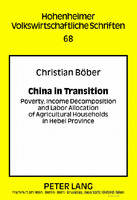China in Transition
Poverty, Income Decomposition and Labor Allocation of Agricultural Households in Hebei Province
Abstract
In China, inequality in social welfare is of rising political concern. This case study analyzes the determinants of well-being of rural households in Hebei using a secondary panel data set (1986 to 2006). One key question is how well-being was affected by institutional changes in times of societal transition. Based on population grouping, the author analyzes poverty and income development. The study reveals impacts of new possibilities to provide labor outside the own farm on the allocation of households’ labor time and the stability of full- and part-time farming over time. The assessments ground on agricultural household models, microeconomic concepts of labor allocation, and welfare theories. Different methodologies, e.g. inequality decomposition or hazard analysis, are applied.
Keywords
Agrarsektor; Agricultural; Agricultural Household Decisions; Allocation; Böber; China; Decomposition; Farm Structure Persistence Analysis; Hebei; Households; Income; Labor; Panel Data; Poverty; Province; Transition; WirtschaftspolitikDOI
10.3726/978-3-653-01676-5ISBN
9783653016765OCN
1045512867Publisher website
https://www.peterlang.com/Publication date and place
Bern, 2012-11-16Series
Hohenheimer volkswirtschaftliche Schriften, 68Classification
Monetary economics
Behavioural economics
Agriculture, agribusiness and food production industries


 Download
Download